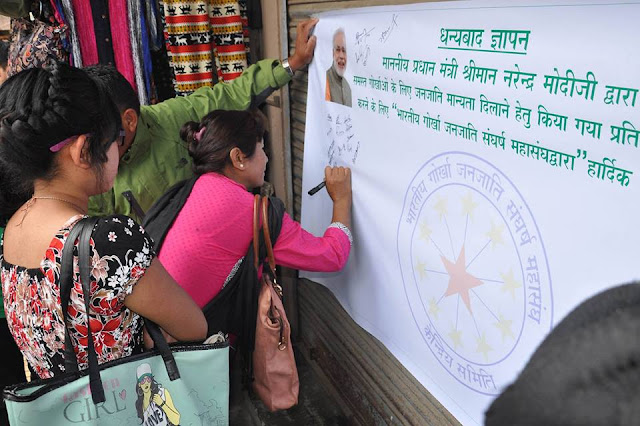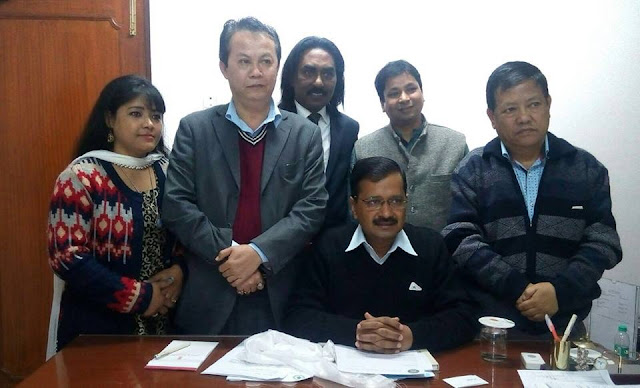Writes Upendra for The Darjeeling Chronicle
Established in 2001, Bharatiya Gorkha Parisangh had the potential to be a major force of change within in the Gorkhali society, while also becoming the platform for uniting Gorkhalis all over India under one umbrella organization.
 |
| Bharatiya Gorkha Parisangh (BGP) logo |
Sadly, their office bearers have jeopardized that pious agenda, perhaps due to their own political ambitions, so much so that today BGP is a name which is uttered with or followed by a cringe, amongst the political observers.
Here is the reason why
Since their inception, one of the major contributions of BGP to our community has been the erection of Shaheed Durga Malla’s statue on the grounds of our Parliament [Details:
http://bit.ly/1MBENqh], thus cementing the Gorkhali contribution towards India’s freedom struggle forever. This was a major achievement of an organization which drew to it members from all over India. BGP branches opened up in Sikkim, Delhi, Assam, Uttarakhand, Himachal Pradesh, Maharashtra, Karnataka, Jharkhand, Mizoram, Manipur, Nagaland, Meghalaya, Tripura, Arunachal Pradesh, Jammu and Kashmir, Chhattisgarh, Uttar Pradesh and Punjab, making it truly a national level platform for voicing issues relating to the Gorkhali community.
POLITICAL AMBITIONS
Perhaps that is what led to the BGP bosses harbouring political ambitions. Perhaps that is when the BGP bosses forgot that their’s was a non-Political organization.
BGP started off as a socio-political group that would highlight and voice the social and political concerns of Gorhalis in India.
When Gorkhaland andolan re-started in 2013 and GJM called for all the “political parties” to form a joint forum, BGP also joined as one of the “parties” constituting the Joint Forum, I guess that is when the downfall of BGP truly began.
In my opinion, BGP being a national level body of the Gorkhas had no business in involving itself with a “joint forum” which was meant to contain political parties. BGP I think should have remained over and above the “joint forum,” as that particular forum was formed to raise the Gorkhakand issue, which even though emotionally related to all the Gorkhas in India, BGP by its very mandate should not have confined itself to the issue of Gorkhaland alone. There are many issues across India that confronts the Gorkhalis, and Gorkhaland happens to be just one of the many such issues, hence BGP could have chosen to support Gorkhaland while remaining uninvolved in the “join forum” deliberations. But that didn’t happen.
The unsuccessful “joint forum” experiment failed miserably, when you have too many political interests clashing it was bound to fail, leaving a sour taste in the mouths of everyone involved. The outcome of “joint forum” was mistrust, doubt and suspicion against each other amongst Darjeeling’s political parties, and sadly that included BGP.
BGP after that stint stopped being a non-Political national level entity, people started to view them as another Political group in the fry.
JAN AAWAZ
Towards the end of 2013 Gorkhaland andolan, one of the well known leaders from BGP Mr. Munish Tamang along with senior journalist Mr. Joel Rai etc went on to form a group called Jan Aawaz, based out of Delhi. I am not very clean on the agenda or orientation of Jan Aawaz, but even they joined the cry for Gorkhaland from Delhi and along with BGP held a Dharna and Protest in Delhi in support of Gorkhaland statehood.
It was only when 2014 elections came around; that I realized that perhaps Jan Aawaz was meant to be the political arm of the BGP, as almost everyone involved with Jan Aawaz was also associated with BGP. Mr. Munish Tamang the leader of Jan Aawaz travelled extensively and had even addressed a Jan Aawaz rally in Darjeeling, prior to the 2014 MP Elections.
For a body claiming to represent the national interest of Gorkhalis in India, by deciding to support Dr. Lama openly BGP had gone on to antagonize the majority Gorkhas of Darjeeling who supported and continue to support GJM.
Anyone with any inclination towards politics understands that keeping a non-Political group out of the purview of electoral politics is one of the most important criterion for maintaining its neutrality. In supporting Dr. M P Lama the BGP leaders may have been doing the right thing, but it sounded the death knell for BGP as an organization.
Connecting political dots becomes is a dicey job as it becomes difficult to connect the interests and orientations of various groups that tend to emerge every once in a while. So when Jan Aawaz died a convenient death of sorts (no action) after the 2014 MP elections, I was more than convinced that it was another failed experiment on the part of some of the BGP leaders to head into politics.
Following the defeat of Dr. MP Lama voices of dissent were heard from within BGP rank and file against the political stand taken BGP central leadership and the decision to support Dr. Lama by Dr. Enos Das Pradhan.
Unhappy with the development Bharatiya Gorkha Parisangh Working President C P Giri and National Vice President Arun Upadhyay accused BGP Executive President Rev Dr. Enos Das Pradhan and a few central committee members of subverting the political neutrality of BGP [Details:
http://bit.ly/1J2Gc2Y].
Cornered BGP claimed that the support was extended at a “personal capacity” and not on an organization basis. Which as the facts so, is untrue [Details:
http://bit.ly/1NiJjKg].
BGP which started as a non-Political group had gone on to become a politically active group which was anti-GJM. I am not a fan of GJM myself, but for a non-Political group which “claims” to represent all the Gorkhas from India, to take such a hard stand against GJM was stupid. If integration of all the Gorkhalis is/was BGP’s actual ambition and aspiration, then there was no reason for them to cut off a major Gorkha group like GJM.
SUPPORT TO GNLF
The final nail in the coffin for BGP as far as I am concerned, came after Mr. Mann Ghising took charge of GNLF, following the death of late Subash Ghising. As GNLF was trying to regroup, BGP national spokesperson Mr. R Moktan stated that “BGP would provide “documentary support” to GNLF if it decides to pursue 6th Schedule status for the Darjeeling region” [Details:
http://bit.ly/1JpzucW].
This again led to another round of outrage from BGP insiders, to which once again Dr. Enos Das Pradhan responded that it was Mr. R Moktan’s personal decision and not that of BGP [Details:
http://bit.ly/1gVCZL8].
Do you see a pattern? I do
BGP leaders support a political group, and when pointed out they claim it was a “personal decision” as an excuse.
BGP which was once a ray of hope that could have gone on to become the strongest lobby group for the Gorkhalis in India, has today lost its direction, sense of purpose and apolitical nature.
YOUTHS SHOULD KNOW
I was forced to write this longish editorial as apparently BGP is trying to recruit new people into their fold and targeting the youths as potential recruiting base. I wouldn’t worry otherwise, but since 2016 elections are around the corner, I have every reason to suspect the timing of their current attempts. Our people, especially the youth have a right to know what has happened with BGP so far, so that they can make an informed decision.
I honestly think that, it is time to for people associated with BGP to realize that they cannot continue to do politics in the guise of a non-Political entity.
Stop pretending!! Is what I am trying to say... and if you guys cannot do that, please stop making trying to fool the people... come clean on your agendas, priorities and political leanings...
फेरी it was कुन्निकोसको “personal decision” चै न भन्नु होला पछि गएर
Is someone listening?













